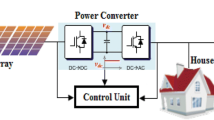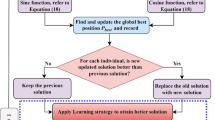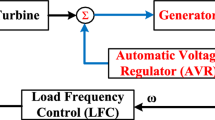Abstract
This paper proposes a genetic algorithms (GA) optimization technique applied to power system stabilizer (PSS) for adapt a robust H2 control based on linear quadratic controller (LQ) and Kalman Filter applied on automatic excitation control of powerful synchronous generators, to improve stability and robustness of power system type single machine connected to an infinite bus system (SMIB). Adaptation technique proposed of the robust H2 control with the various electrical and mechanical parametric variations based on the optimization of the PSS parameters. The genetic algorithms is a search technique based on the mechanisms of natural selection of a genetic and evolution. This optimization technique is more used in the field of control for solve optimal choice problem of regulators parameters. The integration of GA to robust H2 control with robustness test (electrical and mechanical parameters variations of the synchronous machine) show considerable improvements in dynamics performances, robustness stability and good adaptation of the robust H2-PSS parameters under uncertain constraints. This present study was performed using our realized Graphical User Interface (GUI) developed under MATLAB.
Similar content being viewed by others
References
Grouzdev, L.A., Starodebsev, A.A., and Oustinov, S.M., Conditions for the application of the best amortization of transient processes in energy systems with numerical optimization of the controller parameters AVR-FA, Energy, 1990, no. 11, pp. 21–25.
Demello, F.P., Flannett, L.N., and Undrill, J.M., Practical approach to supplementary stabilizing from accelerating power, IEEE Trans., 1978, vol. 97, pp. 1515–1522.
Demello, F.P. and Concordia, C., Concepts of synchronous machine stability as affected by excitation control, IEEE Trans. PAS, 1969, vol. 88, pp. 316–329.
Smolovik, S.V., Mathematical modeling method of transient processes synchronous generators most usual and non-traditional in the electro-energy systems, PhD Thesis, Leningrad Polytechnic Institute, 1988.
Stein, G. and Athans, M., The LQG/LTR procedure for multivariable feedback control design, IEEE Trans. Autom. Control, 1987, vol. 32, no.2.
Naceri, A., Study and application of the advanced methods of the robust H2 and H8 control theory in the AVR–PSS systems of Synchronous machines, PhD Thesis, Saint-Petersburg: SPbSPU, 2002.
Kundur, P., Definition and Classification of Power System Stability, 2002.
Anderson, P.M. and Fouad, A.A., Power System Control and Stability, IEE Press, 1991.
Hong, Y.Y. and Wu, W.C., A new approach using optimization for tuning parameters of power system stabilizers, IEEE Trans. Energy Conv., 1999, vol. 14, no. 3, pp. 780–786.
Ghouraf, D.E., Study and application of the advanced frequency control techniques in the voltage automatic regulator of synchronous machines, Magister Thesis, UDL-SBA, 2010.
Kwakernaak, H. and Sivan, R., Linear Optimal Control Systems, Wiley-Interscience, 1972.
Sofonov, M., Simplifying the H8 PSS theory via loop shifting matrix pencil and descriptor concept, Int. J. Control, 1994, vol. 50, no. 2, pp. 2467–2488.
Yurganov, A. and Shanbur, I.J., Fuzzy regulator of excitation with strong action, Proceeding of SPbSTU Scientific Conference Fundamental Investigation in Technical Universities, Saint-Petersburg, 1998.
Holland, J.H., Adaptation in Natural and Artificial Systems, University of Michigan Press, 1975.
Padiyar, K.R., Power System Dynamics Stability and Control, B.S. Publications, 2002, 2nd. ed.
Hasan Alkhatib, Study of stability for small disturbances in great electrical networks: Optimization of control by a met heuristic method, PhD Thesis, Paul Cézanne University Aix-Marseille, 2008.
Glover, K., Doyle, J.C., Khargonekar, P.P., and Francis, B.A., State-space solutions to standard H2 and H∞ control problems, IEEE Trans. A.C., 1989, vol. 34, no. 8, pp. 834–847.
Author information
Authors and Affiliations
Corresponding author
Additional information
The article is published in the original.
About this article
Cite this article
Ghouraf, D.E., Naceri, A. Robust H2-PSS design based on LQG control optimized by genetic algorithms. Aut. Control Comp. Sci. 51, 301–310 (2017). https://doi.org/10.3103/S0146411617050030
Received:
Accepted:
Published:
Issue Date:
DOI: https://doi.org/10.3103/S0146411617050030




